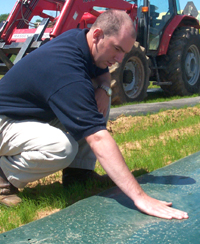Horticulture Demonstrations Bring Latest Solutions to Kentucky Growers
Horticulture Demonstrations Bring Latest Solutions to Kentucky Growers

On a small plot where cantaloupes have been planted, Nathan Howell kneels to adjust the green plastic mulch that covers one of the rows. The plastic helps control weeds, and also warms the soil enabling earlier transplanting.
“We’re comparing the green plastic to black plastic to see which type achieves better results,” said Howell, Extension horticulture associate in the University of Kentucky College of Agriculture. “There’s evidence that the green plastic may be slightly more resistant to frost meaning producers could get the produce to market sooner for a premium price.”
The cantaloupe plot, established at Western Kentucky University’s farm through a cooperative arrangement with UK, is one of dozens of horticulture demonstrations throughout the state on both university and private farms. The demonstrations are helping tobacco and other farmers develop vegetables and fruit crops as alternative income sources.
Funding for the demonstrations, and for the salaries of the UK associates who conduct them, comes from monies provided to the Kentucky Horticulture Council by the state’s Agricultural Development Board. The program’s goal is to get the latest information and technology into the hands of Kentucky’s farmers.
“I’m well pleased with what I’ve seen so far and things look real good,” said David Brumfield, a farmer in west Kentucky’s Hopkins County who grows tomatoes, squash, peppers, sweet corn, sod and tobacco. Brumfield Family Farms is one of the UK demonstration sites.
“Some of the newer equipment they’ve used in the demonstrations that we didn’t have access to before proves to me that it’s probably worth the investment,” he said.
Brumfield works with Extension horticulture associate Shane Bogle who is headquartered at UK’s Research and Education Center in Princeton.
“We do about four locations through the year on private farms,” said Bogle. “These are commercial type applications, and we help them in terms of buying the plastic mulch and the trickle irrigation. We provide some of the services for them so they can carry on the next year on their own.”
The demonstration plots serve as educational sites for other farmers to come and see which growing techniques work best, and what crop varieties are suited to their area.
“The plots help the new growers and give them a place where they can see things growing, or when to spray and when to set,” said Michael Gentry, general manager of the Green River Produce cooperative in south central Kentucky’s Hart County. Gentry said Green River is adding members every year, and shipping cantaloupes, watermelons, pumpkins and cabbage to markets as far away as New York.
“Things like the drip irrigation show our producers how to set up the system, how to make it drip properly, and this has been a big plus,” he said. “The demonstrations prevent them from making mistakes and having to do things over again.”
UK’s horticulture associates conduct classes for farmers during the winter months, then in the spring and summer offer instruction on how to lay plastic mulch, how to set up irrigation systems, and how to keep good records.
“I consider my position to be an educational link between the University of Kentucky, the producers and the marketing opportunities,” said Nathan Howell, who believes his job also is to make sure the latest research results get into the hands of growers.
“Results are published by UK in its vegetable research report that’s put out annually,” he said.
